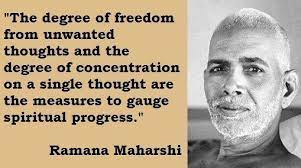Quote from the True charm and power of Vedanta
To weed out the inferiority complex
Those who tend to believe that they are culturally socially and intellectually inferior should, first of all, shake off their inferiority complex. Though it might be deep-rooted it should be possible to weed it out. Of course, it is not so easy throwing away an unwanted article .our first and foremost need –nay duty is to develop confidence in our own immense power, which is latent. in the past seers and men of spiritual insights tried to impress upon us that behind the apparently limited powers of man are hidden unlimited mysterious powers. If only we had the skill to discover them. Today psychologists are reaffirming the same fact with the help of their experimental observations. To arouse the powers, nothing more than self-confidence is required. We should strive to rise from the state in which we are right now. We should gradually attain success, scaling each step through effort.
Whatever negative attitude we might have developed that debilitates us should be curbed. We have to develop a technique to strengthen into self-confidence. This of course is not something that can be accomplished in a single day. Though it may appear impossible in the beginning patience and sustained effort will help us to overcome difficulties and to gain confidence. Confidence is nothing but the feeling of assurance that deep within us there is a store of abundant energy waiting to be released. The lack of this assurance leads to anxiety tar, doubt, inefficiency and all kinds of debility and weakness. This self-confidence enables us not to crave for the mercy of the influential and the powerful prevents us from developing a sense of raging hate saves us from dejection and gives us the inspiration to stand on our own feet. The urge to utilize every opportunity and succeed in life proceeds from this very spirit of self-confidence. .
Swami Vivekananda says that it is the greatest sin to believe that one is weakling and sinner if we have to believe anything let us believe that we are all children of God, that we are all his parts and we share with Him His unlimited energy and His unlimited sense of bliss.
Tuning in to self-reflection for peace sake
By Daisaku Ikeda
As the Ukrainian crisis escalates with dark clouds looming over the world,
the UN High Level Forum on the Culture of Peace was held on September 6 in New
York. Building the Culture of Peace has been a priority theme for the UN since
2000, based on the lessons learnt from the last century beset by war and
violence.
With armed conflict still continuing in different parts of the world, there is no doubt that the road ahead is long and winding. But we must make further efforts to turn around the situation. A breakthrough could be made by turning our gaze to the conditions of those affected by conflict and working together to eliminate existing and emerging threats to peace.
Here, I would like to cite an episode from the life of Gautama Buddha to illustrate the importance of such a perspective. Living in ancient India, he often witnessed violent confrontations over resources. When two tribal groups, one of which is considered to have been related to his family line, were in conflict over water, instead of focusing on their identities or confrontation, he turned his attention to the actual conditions in which people on both sides were suffering from a desperate shortage of water, saying that they were like fish writhing in shallow water.
He identified what he considered to be the essence of the problem: “I
perceived a single, invisible arrow piercing the hearts of the people.” Their
minds were clouded, and they could not recognise that the other group shared
their concerns over the lack of water or the constant fear of being attacked
and overrun.
The tensions over water resources probably escalated because the members
of both groups felt compelled to protect the lives of their loved ones and
community. Once the minds of the conflicting groups are dominated by fear,
however, there is not much that can stop tragedy from unfolding. The Buddha
pointed out, “Look at those who fight, ready to kill. Fear arises from taking
up arms and preparing to strike.”
Conflicts today remain the same in their essential nature. It is,
therefore, crucially important to direct our attention to the plight of those
affected most severely by lingering conflict and work to earnestly seek ways to
remove their suffering.
As many people have understood through their experience of the pandemic, the terrible grief of suddenly losing family members is the same for people in any country, and such tragedies are in essence the same.
The Indian economist Amartya Sen has been a leading advocate of the idea that “the plurality of our identities” can play a key role in helping people resist the pull of mass psychology and the incitements to violence that provoke conflict.
In order to help the culture of peace take root the world over, it is necessary to patiently counteract any incidence of hatred and confrontation that may arise.
We are, by virtue of being human, endowed with the tools that we need for this pursuit: the tuning fork of self-reflection with which to imagine the pain of others as if it were our own; the bridge of dialogue over which to reach out to anyone, anywhere; and the shovel and hoe of friendship with which to cultivate even the most barren and desolate of wastelands.
Even if there are those within another group who are oriented toward
violence and intolerance, the spiral of hatred is only accelerated when we view
that entire group as our enemy. What we need to do is to unite across our
differences to establish clear and universal opposition to all acts of
intolerance or violence.
The writer is the honorary president of the Soka Gakkai and founder of the Soka schools system
IF HE EXISTS
I drive joy there was a doctor in
Benaras who spent 7 minutes in the morning and evening for meditation on God.
Knowing this, his colleagues and friends laughed at him. One day they argued
that he was wasting 7 precious minutes on something, which he had been misled
into believing. The doctor replied, “Well if God does not exist, I agree that
I am wasting 7 minutes a day. But, if He exists? I am afraid you are wasting
your entire lifetime. I prefer to waste 7 minutes rather than a lifetime. Why
should you grudge me the 7minutes joy that I derive 4m.-
ILLUSTRATED REVIEW : 7th heaven moment of the
week in t20 world cup Pakistan no 7 got hatrick, in epl Newcastle no 7
socred a goal






















